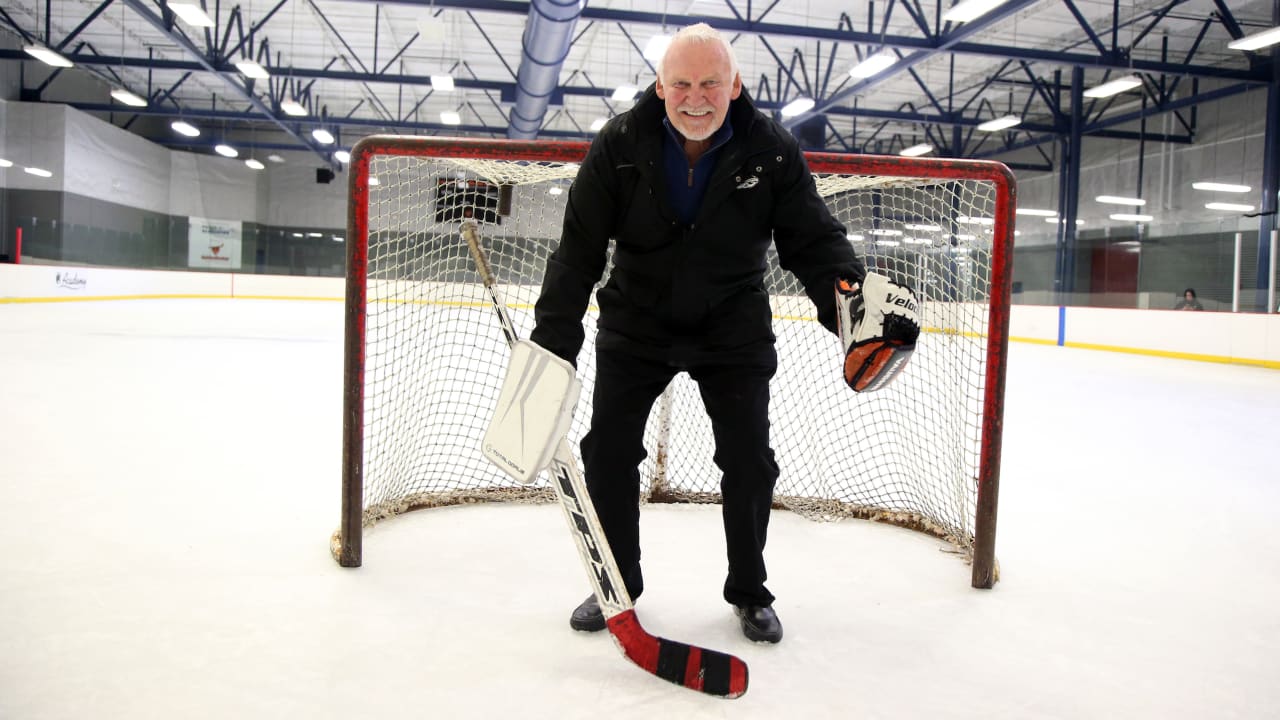Legendary hockey reporter Stan Fischler writes a weekly scrapbook for NHL.com. Fischler, also known as “The Hockey Maven,” brings his wit and insight to viewers every Wednesday. This week reveals how Hockey Hall of Famer Bernie “Boom Boom” Geoffrion helped plant NHL seeds in Atlanta 53 years ago. The interview that follows originated in Geoffrion’s autobiography, “Boom Boom, The Life and Times of Bernard Geoffrion,” first published Jan. 1, 1997.
What made you come to Georgia in the first place?
“I wasn’t happy with my job as assistant general manager of the (New York) Rangers when I got a call from Cliff Fletcher, who was putting together the Atlanta Flames, one of the two new (1972) NHL franchises; the other being the (New York) Islanders. He said, ‘How would you like to be our coach?’ I said, ‘You want me to go to Georgia? What do they know about a puck, a stick and the ice?’ But I listened and Cliff convinced me to come. “
How were you greeted in the South?
“The press conference for my hiring was May 22, 1972, and there was a huge turnout. I told them this straight out: ‘Atlanta is a major league city. The South likes action and hockey is action.’ Right off the bat they loved me because I didn’t put on any airs. Boom Boom was Boom Boom. On top of that, they were intrigued with the idea of a French-Canadian taking over the South. I amused them with my punch line, ‘Y’all come to see us now, ya’ hear.’ That cracked them up.”
What was it like promoting an expansion team?
“I talked to everyone and even did a TV commercial where I skated out on the ice in a tuxedo, carrying a bouquet of flowers and chirping, ‘To all you people in the South, I offer you these beautiful roses. Now come and see our game. It’s better than football.’ The result was that we sold a ton of tickets and I got invitations to do commercials for everything, but I also had to develop a winning team for our home opener Oct. 14, 1972.”
Do you remember that first NHL game in Atlanta?
“The place was packed top to bottom, end to end. We played the (Buffalo Sabres) that night and at the pregame meeting I said, ‘Listen fellas, I’m not the greatest coach in the world, but if you look around the room you’ll see that I don’t have the greatest players either.’ That got a good laugh but then I got serious. ‘If you go out there and prove to the people that you want to play this game, they’ll appreciate you. We wound up with a 1-1 tie leaving our fans enthused, but in a funny way.”
Funny? How?
“They didn’t understand the game. When our goalie, Phil Myre, made a very easy save, the crowd gave him a standing ovation. Eventually, they got to know the difference between tripping and boarding — and that we had a competitive team. By mid-November, we were only a point out of first place and the fans were loving us because we not only competed, we had budding stars.”
Who were the heroes?
“One of them was Curt Bennett, a big, young center who played 16 games for the Rangers and had only one assist. Curt went from no goals in New York to 18 goals for me in only 52 games. Our goalies, Myre and Dan Bouchard, made a terrific combination and we also developed inspirational guys. My captain, Keith McCreary, was our leader along with defenseman Noel Price, a veteran with the heart of a 17-year-old.”
How successful was the first season?
“The bad news was that we missed the (Stanley Cup Playoffs). The good news was that we sold hockey in Atlanta. They loved the Flames and they loved Boom Boom. Wherever I went, ‘The Boom’ was a hero, and it didn’t matter where I went or who I talked to. More than 400,000 fans had come to our games, one of the best gates among expansion teams, but I had to fulfill a promise I made to get them into the playoffs.”
How did you do it?
“In our second season (1973-74), we finished with 74 points. The Islanders, who came into the league with us, had only 56 points. We went up against the (Philadelphia Flyers) in the opening round and fought them as hard as we could but lost in four straight. Still, the Southern fans appreciated us and so did the media. Magazines were doing stories on me and the team and by the end of our playoffs, I felt like the king of Atlanta.”
What stopped you?
“My health. It was nerves that come with coaching pressure. I was losing weight, smoking two packs of cigarettes on game days and losing my players’ confidence. The fun was gone so finally, I told Fletcher, ‘I don’t have it anymore. I’m resigning.’ On Feb. 3, 1975, Cliff called a press conference and made it official. I told the press, ‘Fellas, I’m losing it.’ And that was it — I left.”
Any regrets?
“No, I did what I’d been asked to do, sell NHL hockey in Georgia. Atlanta bought my act and that was reassuring. Also, my wife loved Atlanta and its people and — long afterward — we kept our contacts there. In that sense, I was sorry to leave.”
What was the good news?
“Irving Grundman, the new (Montreal) Canadiens general manager, phoned me after Labor Day, 1979, with the magic words, ‘How would you like to coach the Habs?’ I said, ‘Oui’ and with that another Boom Boom dream came true!”

